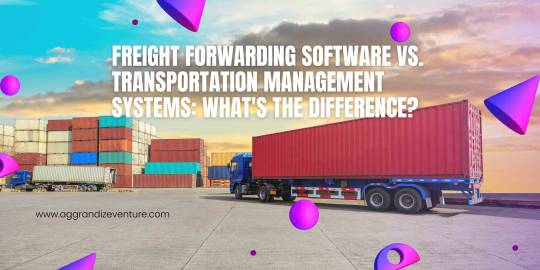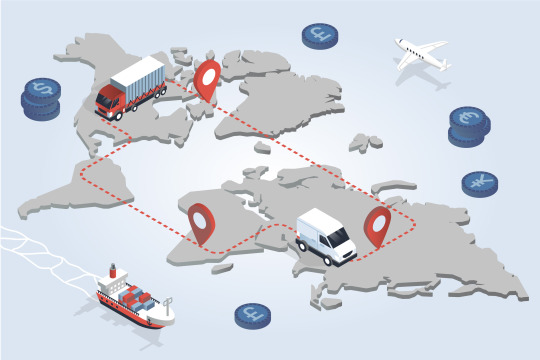#freight forwarding software solution
Text
ERP for Freight Forwarders

Freightcube is the best freight software solution and freight forwarding software in India. Our products will manage the entire freight forwarding process.
Freight Cube is the Best ERP Software for freight forwarders & is highly enable and new generation Freight Forwarding cloud software allows to management and control of Air Freight, Sea Freight, Surface Freight, Warehousing, Multimodal Transport, Customs, & sync it smoothly with CRM, Billing, & Accounting from anywhere, anytime with any device. As the recent pandemic of COVID 19 has disrupted the traditional freight forwarding industry massively the organizations are realizing how important it is to adapt information technology in the field of freight forwarding to avoid any rush or mess up and manage the entire freight forwarding cycle effectively. Freight Cube provides an all-in on one solution for Logistics & Supply Chain Management through its one-click dashboard and enables a user to be on a single platform form to track Forwarding & Clearance of shipments & Cargos.
Request Demo@ Our site
#freight forwarding software#freight forwarding ERP#logistics software solution#digitalized global logistics ERP#freight forwarding software solution#freight software solutions#forwarding clearence software#forwarding clearence software india#best freight forwarding software
0 notes
Text
Our Story
SCMCube Technologies Private Limited is an organization found by the stalwarts of Logistic Industry having profound knowledge and acumen in specialized area of International Logistics, Freight Forwarding, Foreign Trade Policies, Custom Broking, Warehousing, Surface Logistics and Supply Chain and Distribution System.
Our Core Services
Impex Cube - Customs Clearance ERP
Freight Cube - Freight Forwarding end to end Solutions
WMS Cube - Warehouse (IT) Solutions
TMS Cube - Transport Management System
EXIM Link - Traders & Manufacturer
FA Cube - Finance & Accounting
KPO Service - Knowledge Process Outsource(Logistics Documentation)
For More Details, Visit our site : https://scmcube.com/
#digitalized global logistics ERP#customs clearance ERP#freight forwarding software#customs clearance software#best accounting software#customs house agents software#freight software solutions#exim management software
2 notes
·
View notes
Text
5 Ways Consignmate Revolutionizes Freight Management Systems

In today's fast-paced world, efficient freight management systems are crucial for businesses to thrive. Consignmate emerges as a game-changer in this arena, offering innovative solutions to streamline freight operations. Here are five ways Consignmate is transforming freight management systems:
Real-Time Tracking: With Consignmate, businesses can bid farewell to the uncertainty of shipment whereabouts. Its advanced tracking system provides real-time updates on cargo location, allowing businesses to monitor their shipments every step of the way. This feature ensures transparency and enables prompt decision-making, enhancing overall efficiency.
Automated Documentation: Say goodbye to tedious paperwork! Consignmate automates documentation processes, reducing the risk of errors and saving valuable time. From generating invoices to managing customs paperwork, Consignmate simplifies the entire documentation workflow, ensuring compliance with regulatory requirements effortlessly.
Optimized Route Planning: Efficiency is key in freight management, and Consignmate excels in optimizing route planning. Leveraging cutting-edge algorithms, it identifies the most efficient routes, considering factors like distance, traffic, and fuel consumption. By minimizing transit times and costs, Consignmate helps businesses maximize their operational efficiency and profitability.
Integrated Communication: Effective communication is essential for smooth freight operations, and Consignmate facilitates seamless communication across the supply chain. Its integrated platform enables stakeholders to exchange information effortlessly, fostering collaboration and eliminating communication barriers. Whether it's communicating with carriers, suppliers, or customers, Consignmate ensures everyone stays informed and connected.
Predictive Analytics: Anticipating challenges before they arise is crucial in freight management, and Consignmate leverages predictive analytics to do just that. By analyzing historical data and market trends, it forecasts potential disruptions and enables proactive decision-making. Whether it's predicting demand fluctuations or identifying potential bottlenecks, Consignmate empowers businesses to stay ahead of the curve.
With Consignmate, freight management evolves from a daunting task to a streamlined, efficient process. From real-time tracking to predictive analytics, it offers a comprehensive solution to meet the evolving needs of modern businesses.
For More Information
Website : https://consignmate.com/freight-management-system/
Email Id : [email protected]
Phone Number : 1300 271 090
#Logistics management software#Transportation management system#Supply chain optimization#Cargo tracking solutions#Freight forwarding technology
0 notes
Text
Best & userfriendly logistics & freight forwarding software in UAE & India.The logistics software which allows your business to control all your logistics operations
#freight forwarding software#freight logistics software#freight management software#freight software#logistics software#freight transportation software#freight management system#transportation management software#transportation software#ship management software#transportation management solution#logistics management solution#freight shipping software#freight forwarding management system#freight and logistics software#freight forwarding software solutions#freight forwarding management software#transportation and logistics management software#sea freight software#logistics and freight forwarding software#software for freight#logistics shipping software#international freight forwarding software#logistics transport management software#logistics and transportation software#international freight software
0 notes
Text

Revolutionize logistics with our cloud-based transport management software, delivering top-tier Transportation Management System solutions. Our eco-friendly approach ensures agile and cost-effective supply chains. Seamlessly integrate freight forwarding software, fleet management systems, and logistics management software for enhanced efficiency. Our TMS system, coupled with enterprise fleet management, offers comprehensive solutions for transportation and logistics. Experience tech-driven excellence in inventory stock management, warehouse tracking, and fleet maintenance. Elevate your operations with our comprehensive suite of logistics solutions, tailored for sustainability and optimal performance.
#warehouse inventory#warehouse management#fleet management software#transport management software#freight forwarding#warehouse monitoring#cloud software#cloud solutions#transport logistics#inventoring tracking#transport logistics management software#software for logistics management#tms software logistics#transport logistic software#freight forwarding system#inventory and stock management software#warehouse inventory tracking software
0 notes
Text

Ash Logistics and Traders Pvt Ltd is one of the Leading Logistics company in India that offers Cost-Effective, Customized and end to end containerized exim transportation to 800+ growing National and International Industries. Containerization in transportation has revolutionized global trade by making the process more efficient, secure, and cost-effective.
To know more : https://ash-logistics.com
Contact us : +91 95790 95790
E-mail Id : [email protected]
#warehousing#logistics solutions#sea freight forwarder#warehouse#import export business#supply chain#storage containers#logistics#logistics company#yard management#3pl warehouse#logistics management#logistics services#logistics software#supplychainmanagement
0 notes
Text

Implementing a logistics management software solution is easier than it first appears. Although full implementation of the system may take some time, the rewards for your company will be substantial. A logistics management solution will allow you to see more of what's going on in your supply chain, spend less on storage, and keep your stock under tighter monitoring.
#best logistics software#carrier management software#courier management software#delivery route planning software#Final mile delivery solutions#fleet management system#freight forwarding software#freight systems#global freight system#global freight tracking#last mile delivery system#logistics management software#logistics management system#shipping management system#supply chain management system#supply chain software#transport management solution#transport management system TMS#truck dispatching software#truck routing software
1 note
·
View note
Text
#digital frieght forwarding solutions#freight forwarding software#best digital freight forwarding platform#freight logistics platform#freight forwarding digital platforms#digital freight platform
0 notes
Text
Logistics And Freight Forwarding Software Saudi Arabia
We offer Logistics and Freight Forwarding Software in UAE and India. Freight Forwarding Software, Logistics and Freight Forwarding Software UAE and Freight Forwarding Software India.
Logistics And Freight Forwarding Software Saudi Arabia
#Ritzy Software Solutions Llp#Based In India#Is A Leading And Reliable Company Focusing On Software Solutions For Logistics & Freight Forwarding#Inventory Control & Accounting#And Real-estate Management. Our Products Are Loved By Clients For Their Inclusive And Impressive Features And Easy To Use Interface.
0 notes
Text

#Cargoes Runner#erp solutions#logistics#cargoes logistics#shipping#freight forwarding#freight#supply chain#container tracking#erp system#erp for small business#erp software#cargo supply chain system#container shipping#freight rates
1 note
·
View note
Text
Freight Forwarding Software in India

Freight Cube is the Best ERP Software for freight forwarders & is highly enable and new generation Freight Forwarding cloud software allows to management and control of Air Freight, Sea Freight, Surface Freight, Warehousing, Multimodal Transport, Customs, & sync it smoothly with CRM, Billing, & Accounting from anywhere, anytime with any device.
Our Features:-
Mobile APP
Its process for building mobile applications that run on devices like tablet or smartphones.
Console Manifest
We provides the IDs for the dashboards, associated model, and customized identifier.
Reverse Mechanism
Reaverse Mechanism is the process of GST amount by the receiver instead of the supplier.
I-Mail
Its an Email organization app, to manage multiple mail accounts to reach your audience.
Digi Signer
DigiSigner is an online tool for viewing and digitally signing PDF with a ease of use.
E-Invoice
Electronic invoicing system in which all B2B invoices are authenticated electronically.
Eway Bill Integration
Intermediary Interface that allows two separate apps to communicate each other.
CRM Support
If you need any support or queries, Our expert will take care from end to end support.
For More Details Contact Us
HERE
#freight forwarding software#freight forwarding ERP#logistics software solution#digitalized global logistics ERP#freight forwarding software solution#freight software solutions#forwarding clearence software#forwarding clearence software india#best freight forwarding software
1 note
·
View note
Text
Freight Forwarding Software in India
Freightcube is the best freight software solution and freight forwarding software in India. Our products will manage the entire freight forwarding process.
Our Core Services
Impex Cube - Customs Clearance ERP
Freight Cube - Freight Forwarding end to end Solutions
WMS Cube - Warehouse (IT) Solutions
TMS Cube - Transport Management System
EXIM Link - Traders & Manufacturer
FA Cube - Finance & Accounting
KPO Service - Knowledge Process Outsource(Logistics Documentation)
For More Details, Visit our site: https://scmcube.com/freight-forwarding-software-india.html
#freight forwarding software#freight forwarding ERP#logistics software solution#digitalized global logistics ERP#forwarding clearence software#best freight forwarding software
0 notes
Text

Freight Forwarding Software vs. Transportation Management Systems: What's the Difference
Transporting goods across the supply chain can be a complex process that requires careful planning and coordination. To help businesses manage their freight operations, there are two primary software solutions available: transportation management systems (TMS) and freight forwarding software. While these two solutions may seem similar, there are key differences between them that businesses should understand when selecting the right tool for their needs.
Transportation Management Systems (TMS)
A TMS is a software category that focuses on optimizing the physical movement of goods by road, rail, air, or sea. It helps businesses manage their transportation networks by automating tasks like route planning, shipment tracking, carrier selection, and freight audit and payment. TMS software can provide real-time visibility into shipment status, which helps businesses make better decisions and improve their supply chain efficiency.
TMS software is used by two primary user groups: shippers, manufacturers, and distributors, and third-party logistics providers (3PLs). Shippers and manufacturers typically use TMS to manage their inbound and outbound transportation needs, while 3PLs use TMS to provide transportation management services to their customers.
One of the main benefits of TMS software is that it provides shippers and 3PLs with a centralized platform to manage their transportation operations. This allows them to streamline their processes and optimize their transportation networks for maximum efficiency. By automating tasks like route planning and carrier selection, TMS software can also help businesses reduce costs and improve delivery times.
Freight Forwarding Software
Freight forwarding software is a comprehensive solution that enables businesses to manage all aspects of their freight operations in one digital platform. It helps businesses organize and store data, process orders, track shipments, optimize delivery routes, and generate custom reports. With the right freight management system, businesses can reduce costs, improve customer satisfaction levels, and maximize profitability.
Freight forwarding software typically includes features like quote management, carrier selection, shipment tracking, and invoicing. It can also help businesses stay compliant with regulations and industry standards, such as Customs regulations and Incoterms.
Freight forwarding software is particularly useful for businesses that rely on 3PLs to manage their shipping needs. By using a single platform, businesses can ensure that all their freight operations are centralized, which can improve communication and collaboration between different parties in the supply chain. It can also help businesses reduce errors and improve data accuracy by eliminating the need for manual data entry.
Differences Between TMS and Freight Forwarding Software
While both TMS and freight forwarding software are designed to help businesses manage their freight operations, there are key differences between them. The primary difference is their scope: TMS software is focused on optimizing transportation operations, while freight forwarding software is designed to manage all aspects of freight operations, including transportation, warehousing, and inventory management.
Another key difference is their user base. TMS software is used by both shippers and 3PLs, while freight forwarding software is primarily used by 3PLs. This is because freight forwarding software is designed to help 3PLs manage multiple customers and their freight operations, while TMS software is more focused on helping businesses manage their own transportation networks.
Conclusion
In conclusion, businesses that need to move goods across the supply chain have two primary software solutions available: transportation management systems and freight forwarding software. While both solutions are designed to help businesses manage their freight operations, they have different scopes and user bases. Understanding these differences can help businesses select the right tool for their unique needs, whether they need to optimize their transportation operations or manage all aspects of their freight operations.
When selecting a software solution, businesses should consider factors like their current processes, their specific needs, and their budget. They should also look for a solution that is user-friendly and easy to integrate with their existing systems. By choosing the right software solution
2 notes
·
View notes
Text

Best & userfriendly logistics & freight forwarding software in UAE & India. The logistics software which allows your business to control all your logistics operations
#freight forwarding software india#freight logistics software india#freight management software india#freight software india#logistics software india#freight transportation software india#freight management system india#transportation management software india#transportation software india#ship management software india#transportation management solution india#logistics management solution india#freight shipping software india#freight forwarding management system india#freight and logistics software india#freight forwarding software solutions india#freight forwarding management software india#transportation and logistics management software india#sea freight software india#logistics and freight forwarding software india#software for freight india#logistics shipping software india#international freight forwarding software india#logistics transport management software india#logistics and transportation software india#international freight software india
0 notes
Text
Location Infrastructure: The Future of Logistics
Modern consumers seek things that are both reasonably priced and easily accessible at any time in today's globalized and connected culture. Supply chains must be dependable and robust for this.
The weakest connection in supply chains determines how robust the network is, and as recent years have shown, transportation is typically that weak link. Logistics is the more accessible and more effective transportation and management of a complicated activity. In business, logistics is the movement of goods from their origin to their final destination to satisfy the demands of clients or companies.
Some companies use drones for international courier services and ocean freight forwarding services. This will reduce the time it takes to deliver packages from days to hours. Therefore, businesses can deliver the value consumers want without blowing their budgets on transportation logistics or impeding the flow of commodities vital to the global economy.

Opportunity in India
One of the largest in the world in terms of logistics, India offers a substantial market opportunity.
The industry, which includes transportation, warehousing, and other supply-chain solutions spanning from the suppliers to the end customers, logistics as an industry is essential for the nation's economic progress.
Role of Technology
Society is evolving thanks to technology. The world is heading toward automation in a big way, and businesses are less and less interested in activities that need physical labour or human interaction.
Technology enhances interconnections between various industries and companies by meeting client requests and facilitating effective business tactics that increase revenue and lessen rivalry. The logistics sector has been significantly touched by technology.
Several technologies are altering the future of the logistics sector.
Automation
Automation enhances a machine's productivity by utilizing data from software to produce the best outcomes with high precision. Automation benefits everything from better package labelling to effective warehouse sorting systems and quick deliveries. Future leaders in logistics will be the companies that use automation first.
Systems for tracking shipments
Users can keep an eye on and track their shipments by using it. It offers customer account information on the consignment assigned to them, customized reports, and notifications for shipments and messages. These systems improve the user experience.
Internet of Things (IoT)
The Internet of Things (IoT) is a network where physical things are implanted with microchips and software to enable communication with other devices. The logistics sector has been utilizing IoT devices to gather data, lessen superfluous duties, and streamline processes.
Radio waves are used by Radio Frequency Identification (RFID) RFID to read data stored in RFID tags or smart labels. These radio waves assist in locating, identifying, and communicating with both people and objects.
An antenna, an RFID tag, and an RFID reader make up an RFID system. An integrated circuit and an antenna make up RFID tags, which transmit data to an RFID reader (also known as an interrogator).
The reader assists in converting the radio waves into more meaningful data. The operating systems get the information received from tags through a communication interface, which is then saved in a database and later processed for analysis.
Automated vehicles and drones
Drones could soon be used to deliver our orders thanks to technology. We can already see autonomous trucks on the road in the next few years.
GPS accuracy was improved
In the past, printed maps were utilized to navigate distant locations, but with the advancement of technology, today, cars come equipped with GPS. These gadgets' accuracy has dramatically improved over the years, which has helped disgruntled and lost drivers and the supply chain. By tracking the whereabouts of trucks and facilitating a simple route thanks to access to up-to-date traffic information, GPS's high precision enables higher production and delighted consumers.
Social media
The power of social media is enhancing operations and the logistics sector as a whole. These platforms are increasingly the simplest and most effective means for businesses to interact with customers and swiftly disseminate important information, market news, and client feedback.
Blockchain
Blockchain has a lot to offer the logistics sector. Automating the process, minimizing paperwork, and improving inventory transparency and traceability, enables businesses to operate more efficiently. Since all data is exchanged from the manufacturing site until it reaches the end user, supply chains are more secure.
Robotics
Like automated devices, robots are made to carry out human activities. It performs human movements and tasks and has a human appearance. The logistics sector can benefit from this feature. The logistics sector has found it challenging to meet market demand due to the massive growth of e-commerce, a problem that robotics has resolved. In addition to taking less time than people, it is also more productive.
Conclusion
The global supply chain's productivity has increased thanks to technology, which has also decreased expenses and errors. Transportation, international courier service transportation (by sea and air), supply chain management, and shipment tracking are examples of how the logistics industries have benefited. Many businesses offer solutions to the logistics sector to make their jobs easier. This company is making great future benefits for its clients.
2 notes
·
View notes
Text
Benefits of Partnering with a Logistics Shipping Company for Cross-Border Trade
In the increasingly interconnected global economy, businesses are continually seeking ways to expand their reach and optimize their operations. Cross-border trade has become a vital component of this strategy, enabling companies to access new markets and diverse customer bases. However, navigating the complexities of international shipping can be daunting. This is where the expertise of a logistics shipping company comes into play. By partnering with a logistics provider, businesses can not only streamline their supply chains but also enhance their overall operational efficiency.

Expertise in Regulatory Compliance
One of the primary advantages of working with a logistics shipping company is their extensive knowledge of international regulations and compliance requirements. Shipping goods across borders involves navigating a labyrinth of customs regulations, tariffs, and import/export laws that can vary significantly from one country to another. A proficient logistics partner understands these complexities and can help businesses comply with all necessary regulations, thus avoiding costly penalties and delays.For instance, logistics companies often have dedicated teams that monitor changes in trade policies and customs procedures. This expertise ensures that shipments are prepared with the right documentation, minimizing the risk of customs inspections that can slow down the delivery process. By leveraging this specialized knowledge, businesses can focus on their core operations, confident that their logistics partner is handling the intricacies of cross-border trade efficiently.
Cost Efficiency and Competitive Pricing
Another compelling reason to partner with a logistics shipping company is the potential for cost savings. These companies have established relationships with carriers and freight forwarders, enabling them to negotiate better rates for shipping services. This advantage is particularly beneficial for businesses that may not have the volume or leverage to secure competitive pricing on their own.Moreover, a logistics shipping company can provide tailored solutions that optimize shipping routes and methods. By analyzing shipping patterns and leveraging data analytics, these companies can identify the most cost-effective transportation options. This not only reduces shipping costs but also minimizes transit times, which is crucial in today’s fast-paced market environment.
Enhanced Supply Chain Visibility
In the realm of cross-border trade, visibility is paramount. Businesses need real-time information about the status of their shipments to make informed decisions and keep customers updated. A logistics shipping company offers advanced tracking solutions that provide visibility into every stage of the shipping process.Through state-of-the-art technology, such as GPS tracking and shipment monitoring software, logistics providers can offer businesses real-time updates on their shipments. This transparency not only improves operational efficiency but also enhances customer satisfaction. Clients appreciate knowing where their orders are and when they can expect delivery, leading to increased trust and loyalty.Additionally, many logistics companies offer online platforms where businesses can manage their shipments, access important documentation, and communicate with customer service representatives. This level of access empowers businesses to stay informed and responsive, ultimately leading to improved service delivery.
Risk Mitigation and Problem Resolution
Cross-border trade inherently involves a degree of risk, from potential delays caused by customs issues to the possibility of damage or loss of goods during transit. Partnering with a logistics shipping company can significantly mitigate these risks. Experienced logistics providers have the expertise to anticipate potential challenges and implement proactive measures to address them.For instance, a logistics partner may conduct thorough risk assessments before shipments are dispatched. They can identify potential bottlenecks and develop contingency plans to minimize disruptions. In the event of an issue, such as a shipment delay or damage, logistics companies often have established procedures for swift resolution. This proactive approach not only saves time and money but also strengthens the business’s reputation for reliability.Moreover, many logistics shipping companies offer cargo insurance options, providing an added layer of protection for businesses. This insurance can cover losses due to theft, damage, or other unforeseen circumstances, giving businesses peace of mind as they engage in cross-border trade.
Scalability and Flexibility
As businesses grow and evolve, their logistics needs may change. A logistics shipping company offers the scalability and flexibility necessary to adapt to these changes. Whether a business is expanding into new markets or experiencing fluctuations in demand, a logistics partner can provide the resources and solutions needed to accommodate growth.For example, during peak seasons or promotional events, businesses may require additional shipping capacity. A logistics shipping company can quickly scale up operations to meet these demands, ensuring that shipments are dispatched on time. Conversely, during slower periods, businesses can adjust their logistics needs without incurring unnecessary costs.This flexibility extends to service offerings as well. Logistics providers can accommodate a range of shipping methods, from air freight for urgent deliveries to ocean freight for cost-effective bulk shipments. This versatility allows businesses to tailor their logistics strategies to align with their specific goals and challenges.
Focus on Core Competencies
By partnering with a logistics shipping company, businesses can refocus their efforts on their core competencies. Managing logistics can be time-consuming and complex, diverting attention away from essential business functions such as product development, marketing, and customer service. Delegating logistics responsibilities to a specialized partner allows companies to concentrate on what they do best.Furthermore, logistics providers often have access to the latest technologies and industry best practices. By leveraging these resources, businesses can enhance their operational efficiency without the need for significant investments in logistics infrastructure. This strategic partnership enables companies to remain competitive and agile in an ever-changing market landscape.
Conclusion
In the realm of cross-border trade, partnering with a logistics shipping company offers numerous benefits that can significantly enhance a business's operational efficiency and competitiveness. From ensuring compliance with complex regulations to providing cost-effective shipping solutions and improved visibility, logistics providers are invaluable allies in navigating the challenges of international trade.As businesses seek to optimize their supply chains and expand their global reach, the expertise and resources of a logistics shipping company can prove essential. By leveraging the capabilities of these partners, companies can mitigate risks, improve customer satisfaction, and ultimately drive growth in the dynamic world of cross-border trade. Whether a business is just starting to explore international markets or looking to enhance its existing logistics operations, partnering with a logistics shipping company is a strategic decision that can lead to lasting success.
0 notes